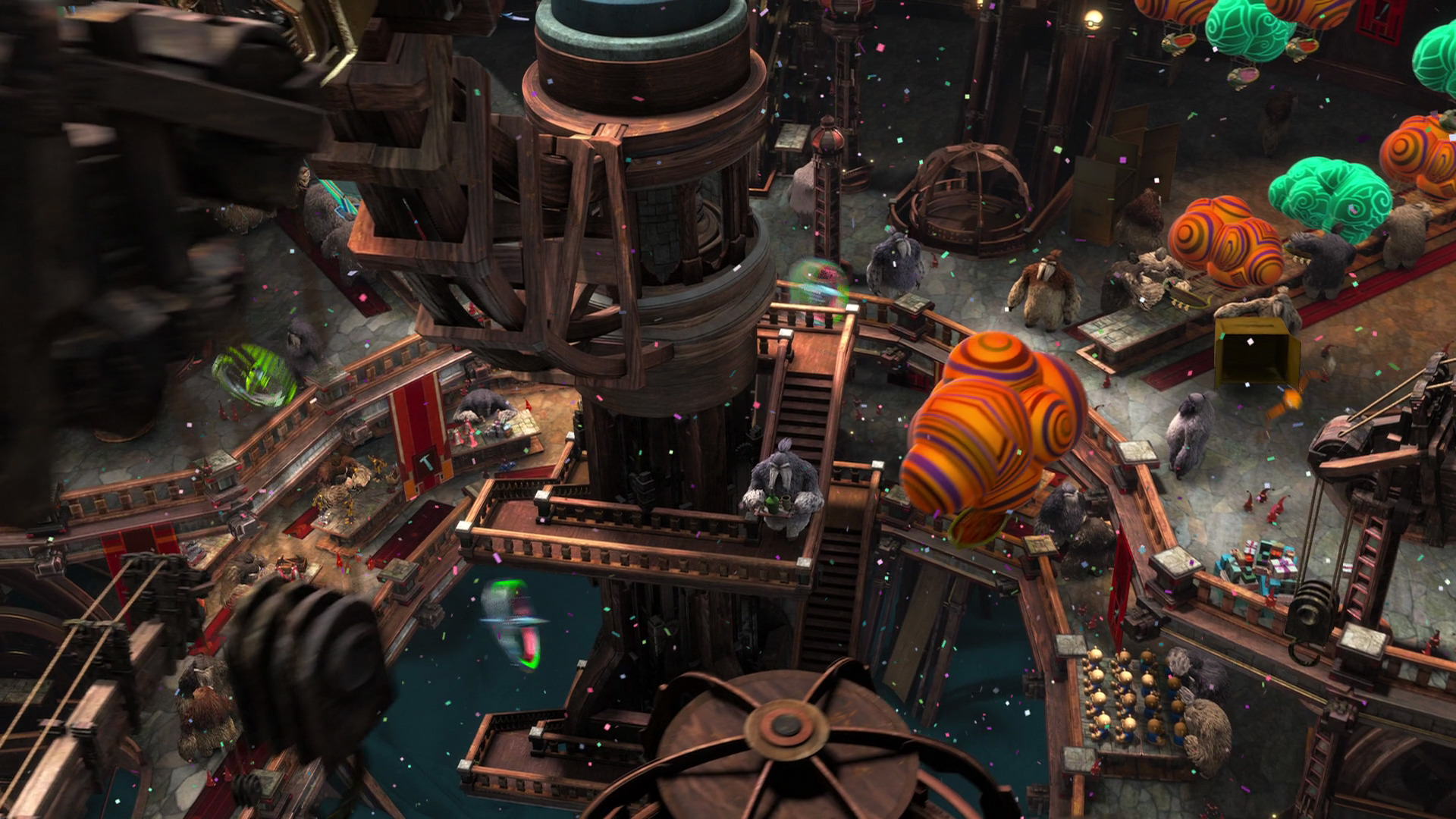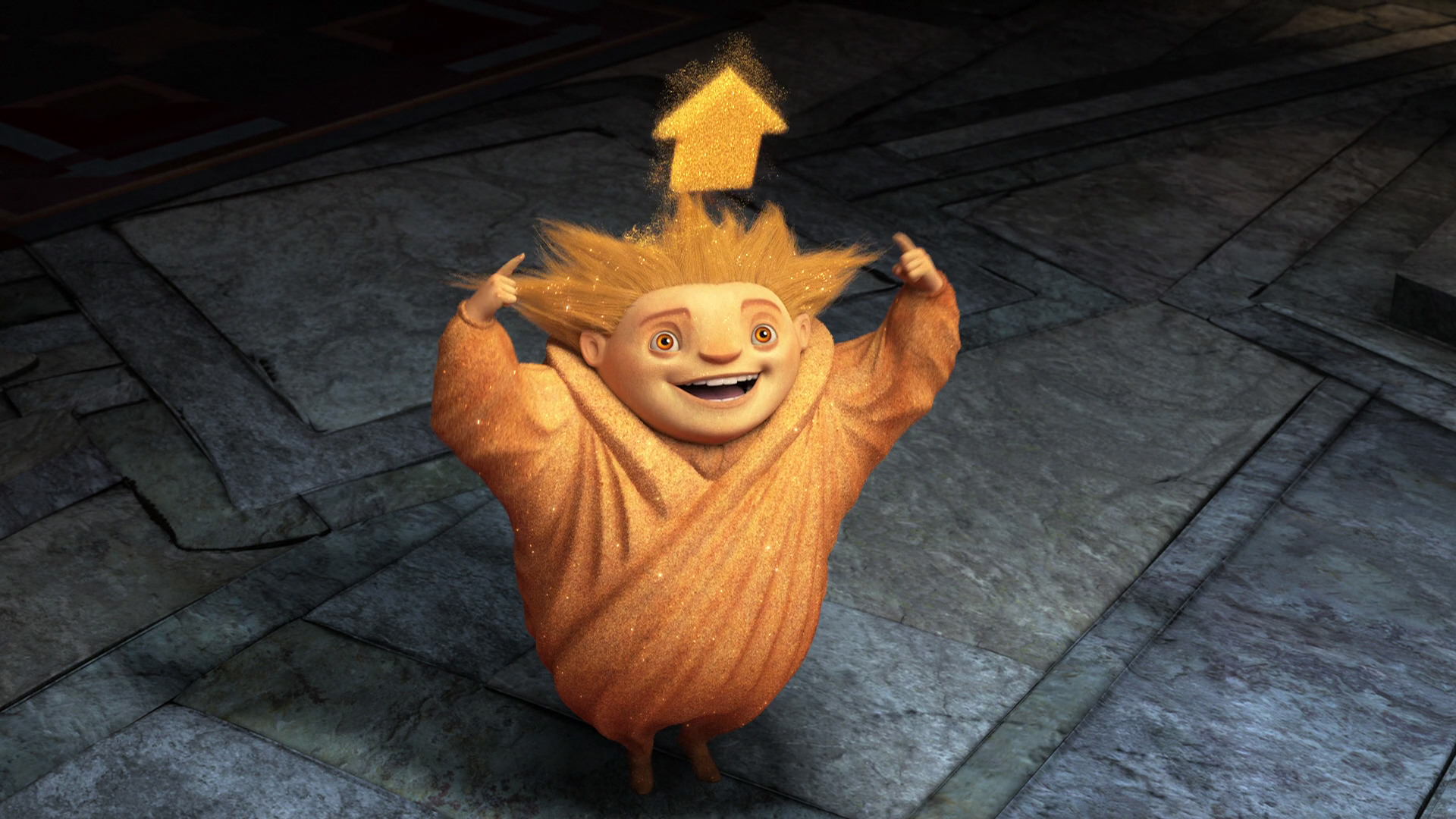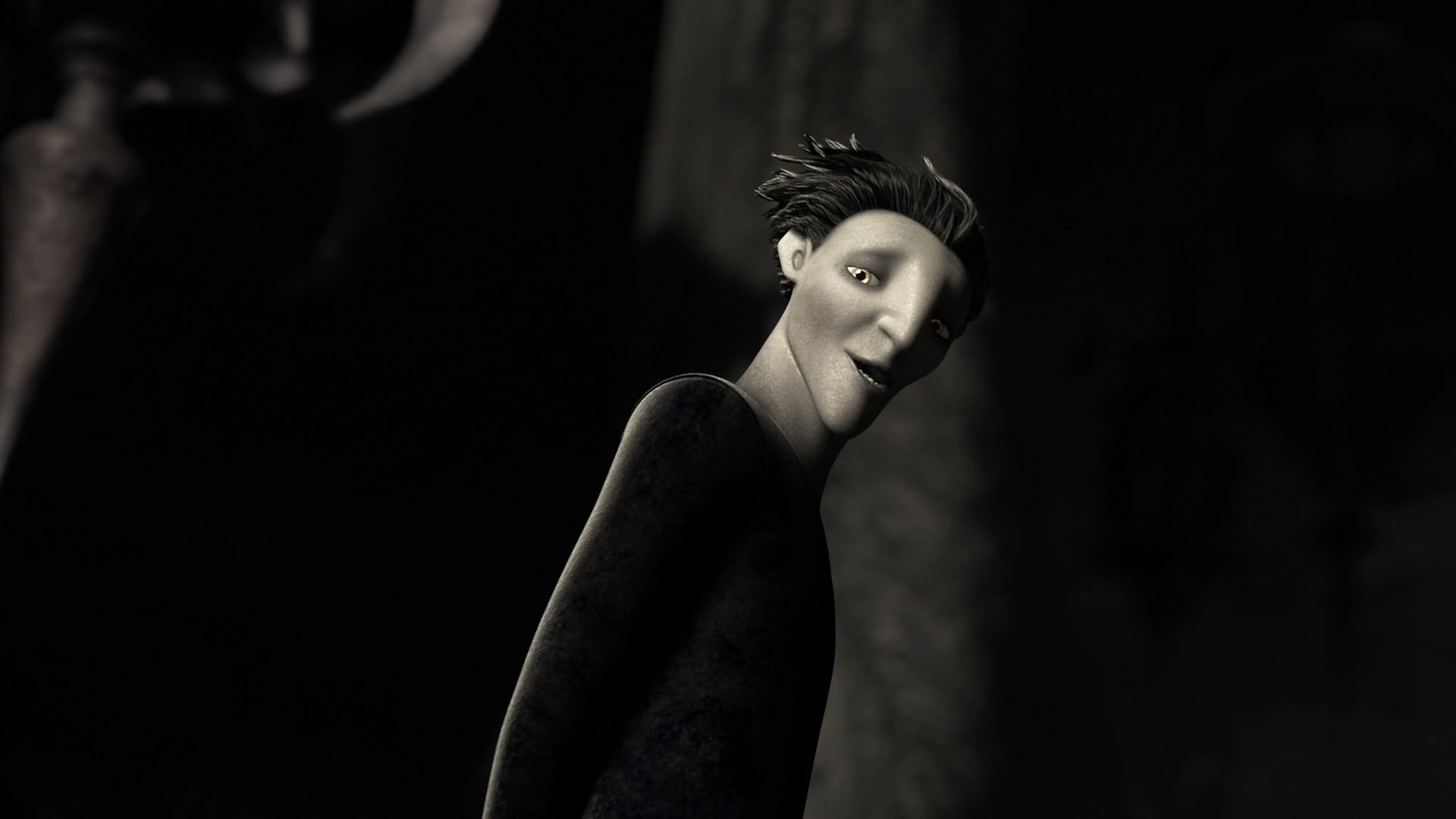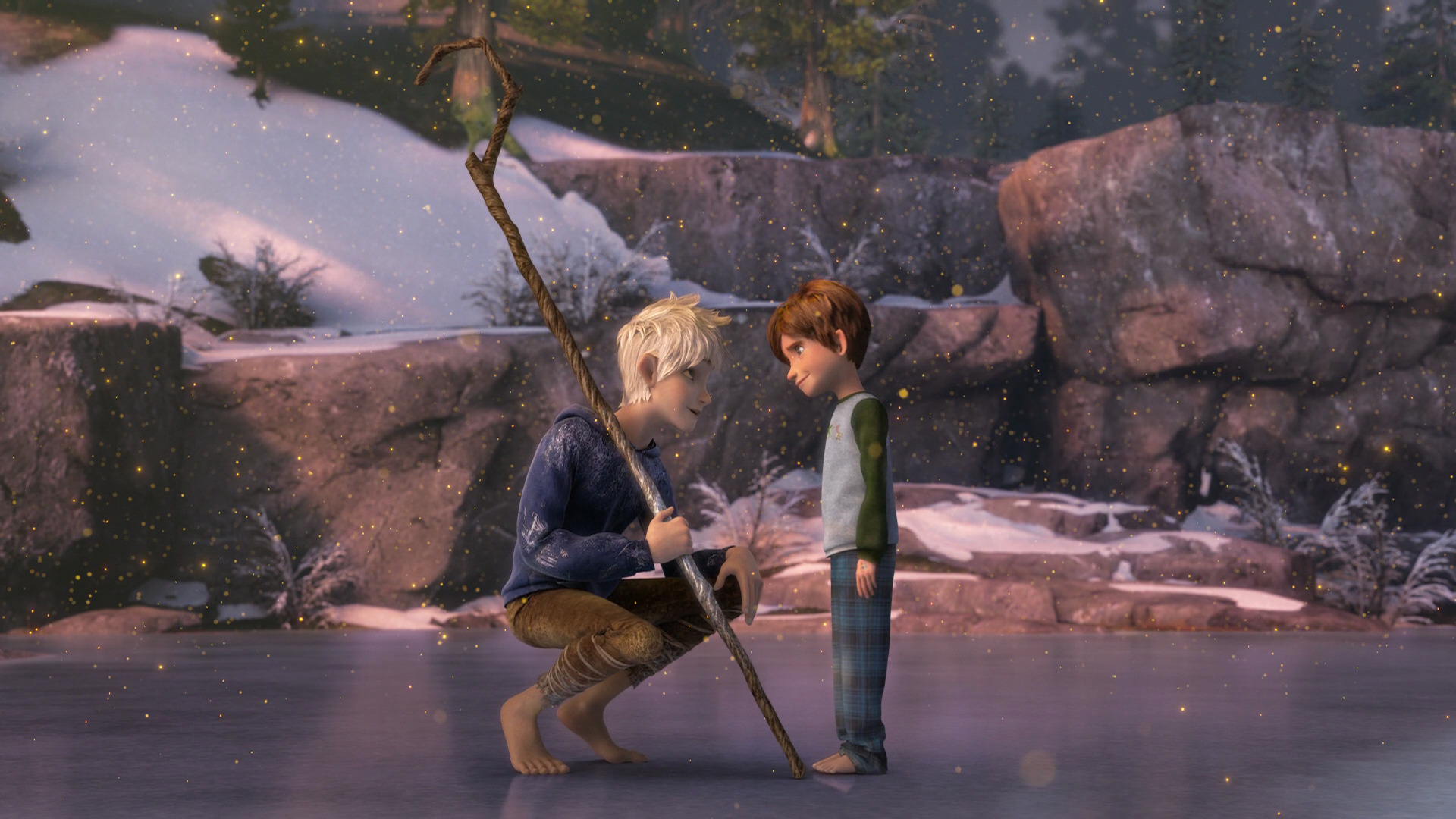I feel a bit guilty that so many of my Animation Station blog posts have been about Disney and so few have been about Dreamworks, especially since I’m planning on doing another one about a Disney movie soon as well as an Adaptation Station post that just happens to be about an animated Disney film. The only Dreamworks animated movie I really feel like writing about though is Rise of the Guardians (2012.) That’s not to say I consider it the best one or, for that matter, the worst. My favorite is Kung Fu Panda if it isn’t one of their collaborations with Aardman or one of the movies I’ve already covered here. But I don’t feel like I have anything to write about those movies that others haven’t already expressed better or will express better in the future. But I do have things to write about Rise of the Guardians. This movie wasn’t a critical or a commercial hit upon its release but has since gained a following. I can understand both of those things.
Rise of the Guardians is based, somewhat loosely, on the book series The Guardians of Childhood by William Joyce, a children’s author who has had a surprisingly big impact on American animated films. The premise is that Santa Claus (voiced by Alec Baldwin), the Easter Bunny (Hugh Jackman), the Tooth Fairy (Isla Fisher) and the Sandman (voiceless) are powerful immortal beings tasked with keeping childhood a magical, rewarding time of life. But their ancient foe, long thought defeated, has reemerged. Pitch Black the Boogeyman (Jude Law) seeks to destroy children’s belief in the Guardians and fill their lives with fear. To combat this threat, the mysterious Man in the Moon chooses rootless winter spirit Jack Frost (Chris Pine) to be a new Guardian.

Now there are a lot of holes I could pick in all this. It’s presented as a terrible thing for kids to lose faith in the Easter Bunny, but I don’t know how many actually care about him in real life. Easter just doesn’t have that much of an interesting secular mythology compared to Christmas. The movie even jokes about the Bunny not being as big a deal as Santa early on but then turns right around and presents him as a huge deal. I’m pretty sure even as kids, we all knew the Tooth Fairy was a joke, and the Sandman is considered just an expression like Jack Frost. The only one of these characters in whom a lot of kids believe is Santa Claus and I’m not even sure how true that is nowadays. The reason people can see the four Guardians and not Jack is that they believe in them but since all those Guardians are supposed to do their jobs unseen, isn’t that a rather counterproductive system? If it’s so important for children to believe in them, why don’t the Guardians make a public appearance as soon as they hear of Pitch’s threat?[1]The idea that what they need is for kids to believe in them without proof is appealing but the story ends up contradicting it. And if the Guardians lose their powers if everyone stops believing in them, wouldn’t Jack be more of an asset if he didn’t become a Guardian and therefore didn’t share their weakness?
OK, enough nitpicking. On to more serious critique.
When you go into a Dreamworks movie featuring Santa Claus as a muscular, hard bitten, saber wielding warrior with a thick Russian accent and the Easter Bunny as a muscular, hard bitten, boomerang wielding warrior with a thick Australian accent, you go in with certain expectations, mainly the expectation that this will be a comedy.[2]Not necessarily a good comedy, mind you, but a comedy. But Rise of the Guardians weirdly plays its goofy premise as a straight fantasy adventure. The prologue, in which Jack Frost comes to life with no memory of his origins or identity and finds he’s invisible to everyone, could have come from a drama and when we finally do learn about Jack’s origins, they’re shockingly dark and come with the implication that the other Guardians had dark origin stories too. The movie does display a sense of humor more frequently than the books by William Joyce which also had this strange disconnect between premise and tone, but no more frequently than your average drama with comic relief. Honestly, I’m not even sure at what audience this film is aimed. I feel like kids young enough to really believe in Santa Claus, etc., aren’t ready for this kind of action-adventure and kids old enough for it wouldn’t be caught dead going to see a movie about Santa Claus, etc. Rise of the Guardians feels like a kids’ movie but the theme of protecting childhood innocence seems like something that would only resonate with adults.[3]That’s probably why the movie is titled Rise of the Guardians even though The Guardians of Childhood would have fit the content better. Yet in the end, the movie actually achieves the mythic power for which Joyce strove in his book series and which, in my opinion, he largely failed to attain.[4]I really only read the whole thing because I wanted to be able to compare it to the movie on this blog.

The film’s premise may be wacky, but its narrative is formulaic. (This paragraph is naturally going to spoil much of it, but I feel like you can predict most of this.) An antihero gets asked to join a group of heroes. The antihero refuses. Then the villain does something terrible, establishing himself as a serious threat and giving the antihero a selfish motivation to help the heroes. The antihero bonds with the heroes and becomes more genuinely heroic. But the antihero messes up[5]Remember that selfish motivation I mentioned? with major consequences and the heroes decide they Never Should Have Trusted Him. The villain approaches the antihero and offers to let him join him, saying They’re Not So Different. The antihero refuses. Then the antihero has a big revelation and saves the day. To be fair, that’s not a bad structure for a story. I don’t feel that Rise of the Guardians does anything too interesting with it until the last act though.
The movie’s visuals are basically fine. Dreamworks, at this point, had enough money and was lavish enough when it came to throwing it around that this was never going to look that bad. It doesn’t look as beautiful as might be wished though. The various domains of each Guardian just aren’t as magical or appealing as they should be.



And the character designs all fall somewhere between bland and vaguely ugly.


The most fun part of the movie visually is the character of the Sandman who communicates entirely through images made of floating sand that hover above his head.

Alec Baldwin and Hugh Jackman make little impression as the voices of Santa Claus[6]He’s mostly just called North which made more sense in the books. and the Easter Bunny. In all fairness though, the script by playwright David Lindsay-Abaire doesn’t give them much interesting with which to work. Isla Fisher is a bit more fun as the Tooth Fairy but that may be just because she gets most of the movie’s better jokes. Chris Pine’s performance as Jack is a mixed bag. Sometimes he’s great, especially towards the end. At other times, he just sounds bored and mumbly. He also sounds far too old for this youthful character.[7]I feel the same way about Jay Baruchel as the voice of the lead in the original How to Train Your Dragon. The best vocal performance is that of Jude Law as Pitch Black who makes for a good cartoon villain. If the movie were just a little better at creating a creepy atmosphere, he’d be a great one. His character design being vaguely ugly even makes sense for the character.

There are some clever touches like Jack Frost having an antagonistic relationship with the Easter Bunny, a figure associated with springtime, but despite holding the world record for being on the naughty list, having a good relationship with Santa, another winter-related character. I also like that the movie has Jack apologize for insulting the Bunny as part of his character development when I probably wouldn’t have noticed if he hadn’t. And the surprising decision to make the Man in the Moon an invisible, Godlike presence rather than characterizing him like the other mythical figures works well.

So far, I’ve made the movie sound middling. Why did I feel like writing about it after all these years then? What makes it interesting besides the oddly serious execution of a goofy premise? Well, as I’ve indicated above, I feel the conclusion really elevates what came before, tying together the movie’s themes of finding one’s purpose in life, facing childhood fears and the importance of childlike faith in an emotionally resonant way. But to explain all that, I’d have to spoil the whole thing for those who haven’t watched the movie. On the other hand, if I don’t explain it, I risk overhyping it. People might very well read this blog post[8]OK, not super likely., become curious, go watch the movie and then wonder what on earth I meant. The following paragraph is my attempt at a compromise, both getting into some specifics and keeping the description broad. If you’d really like to see the movie unspoiled, just skip it.
Pitch’s goal throughout the story is to get children everywhere to believe in and therefore fear him. An unspoken question is what are the Guardians supposed to do about that? Should they try to make kids believe Pitch doesn’t exist when he obviously does? It turns out that the way to defeat the Boogeyman isn’t so much to disbelieve in him as it is to not fear him. That’s where Jack comes into the picture. Another question in the movie, this one spoken, is how is he supposed to be one of the Guardians when they reward the nice and punish the naughty whereas he shuts down schools and encourages kids to throw snowballs at each other? It turns out mischief is useful for helping children overcome fear. I am reminded of The Screwtape Letters by C. S. Lewis. The book’s narrator confides that, as a demon, it’s his job to tempt humans with fun but he doesn’t really like it, saying, “(fun) has wholly undesirable tendencies. It promotes charity, courage, contentment and many other evils.” I lied when I called Jude Law’s vocal performance the best in the movie. That honor really goes to Dakota Goyo as the young boy with whom Jack bonds in the film’s last act.[9]This footnote is really going to give away something specific, especially if you’ve been paying attention but I feel compelled to include it anyway. I especially like that when Jack finally … Continue reading

All that plays out beautifully and it’s why I’m fond of Rise of the Guardians. Great conclusions don’t always save so-so works of art in my experience, especially not when they don’t connect much to do with what precedes them. But the climax and ending of Rise of the Guardians, again, satisfyingly ties together themes the story has already established, elevating what came before in retrospect. And honestly, while I’ve ragged on this aspect of the movie, there’s something endearingly quixotic about its insistence that belief in the Easter Bunny is vital to a child’s mental well-being.
References
| ↑1 | The idea that what they need is for kids to believe in them without proof is appealing but the story ends up contradicting it. |
|---|---|
| ↑2 | Not necessarily a good comedy, mind you, but a comedy. |
| ↑3 | That’s probably why the movie is titled Rise of the Guardians even though The Guardians of Childhood would have fit the content better. |
| ↑4 | I really only read the whole thing because I wanted to be able to compare it to the movie on this blog. |
| ↑5 | Remember that selfish motivation I mentioned? |
| ↑6 | He’s mostly just called North which made more sense in the books. |
| ↑7 | I feel the same way about Jay Baruchel as the voice of the lead in the original How to Train Your Dragon. |
| ↑8 | OK, not super likely. |
| ↑9 | This footnote is really going to give away something specific, especially if you’ve been paying attention but I feel compelled to include it anyway. I especially like that when Jack finally gets someone to believe in him, he’s not trying to do so. Instead, he’s trying to help another Guardian and his least favorite one at that. |
